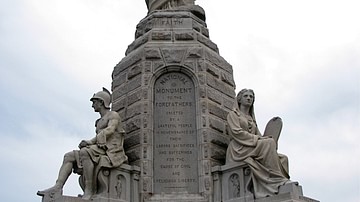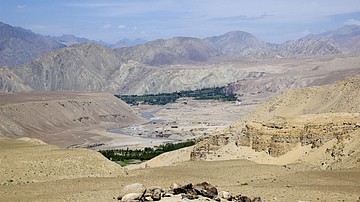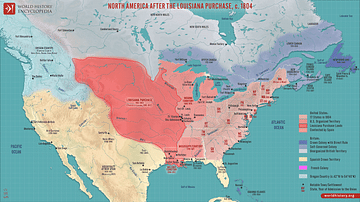Search
Search Results

Article
Mayflower Passengers & Crew
The 102 Mayflower passengers were a diverse group made up of religious separatists (later known as pilgrims) and others referred to by the pilgrims as Strangers (people who did not share their faith). The ship also had a crew of approximately...

Article
Charles A. Eastman on Crazy Horse
Charles A. Eastman's biography of Crazy Horse (l. c. 1840-1877) is among the most significant sources on the great Sioux war chief, as Eastman drew on accounts of those who had known and fought alongside him in writing it. The work differs...

Definition
Yahweh
Yahweh is the name of the state god of the ancient Kingdom of Israel and, later, the Kingdom of Judah. His name is composed of four Hebrew consonants (YHWH, known as the Tetragrammaton) which the prophet Moses is said to have revealed to...

Definition
Aryan
Aryan is a designation originally meaning “civilized”, “noble”, or “free” without reference to any ethnicity. It was first applied as a self-identifying term by a migratory group of people from Central Asia later known as Indo-Iranians (who...

Definition
Kingdom of Israel
The Kingdom of Israel occupied that part of the land on the Mediterranean Sea known as the Levant which corresponds roughly to the State of Israel of modern times. The region was known, historically, as part of Canaan, as Phoenicia, as Palestine...

Definition
Great Exhibition
The 1851 Great Exhibition was held in the purpose-built Crystal Palace in Hyde Park, London, to showcase the latest developments in engineering, science, and the arts, as well as objects of cultural significance from Britain and abroad. Running...

Definition
Louisiana Purchase
The Louisiana Purchase was a land deal made in 1803, in which the United States purchased 828,000 square miles (2,144,510 km²) of land west of the Mississippi River from France for $15 million, or an average of three cents per acre. The purchase...

Definition
Louis Philippe II, Duke of Orléans
Louis Philippe II, Duke of Orléans (l. 1747-1793) was a French noble of royal blood. He was the head of the House of Orléans, a cadet branch of the royal Bourbon dynasty, and was a cousin of King Louis XVI of France (r. 1774-1792). Despite...

Definition
Ludwig van Beethoven
Ludwig van Beethoven (1770-1827) was a German composer of Classical and Romantic music; he is widely regarded as one of the greatest musicians to have ever lived. Most famous for his nine symphonies, piano concertos, piano sonatas, and string...

Definition
Mountain Meadows Massacre
The Mountain Meadows Massacre (11 September 1857) was a conflict between the Mormons (Church of Jesus Christ of Latter-day Saints) and the wagon train of the Baker-Fancher party, who were traveling through Utah to California, resulting in...